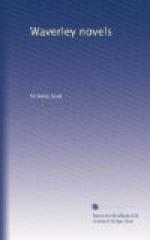|
This section contains 10,912 words (approx. 37 pages at 300 words per page) |

|
SOURCE: Hamilton, Paul. “Waverley: Scott's Romantic Narrative and Revolutionary Historiography.” Studies in Romanticism 33, no. 4 (winter 1994): 611-34.
In the following essay, Hamilton assesses Scott's writing in Waverley as historicist, while illuminating Scott's ironic treatment of romanticism and his philosophical distance from revolutionary ideology in the work.
More than most romantic novels, Scott's inaugural Waverley places itself within the contemporary scene of writing, reviewing its own possibilities quite openly—Gothic tale, Germanic romance, sentimental or fashionable upper-class yarn—and self-consciously pondering the problem of recovering a universal subject-matter in front of a modern audience sensitive to contemporary generic options. Like Friedrich Schlegel, Scott characterizes his audience as “this critical generation.” Like Wordsworth, he wishes to restore an understanding of “the human heart” through a historically colored reading of “the great book of nature, the same through a thousand editions” (5). Cervantes and Calderon, favorites of the romantic ironists, provide him with...
|
This section contains 10,912 words (approx. 37 pages at 300 words per page) |

|


